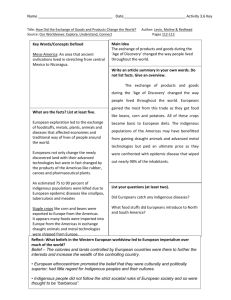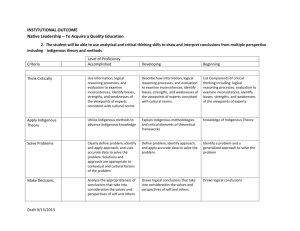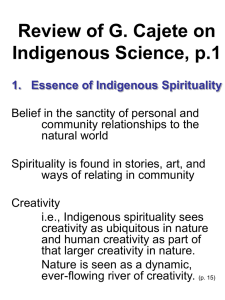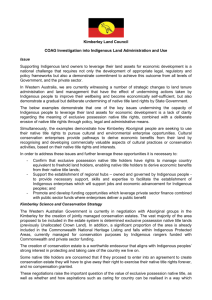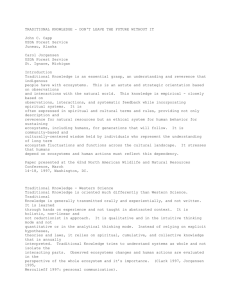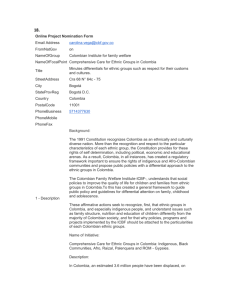Presss Release Conserving biocultural diversity 25.03.2013
advertisement
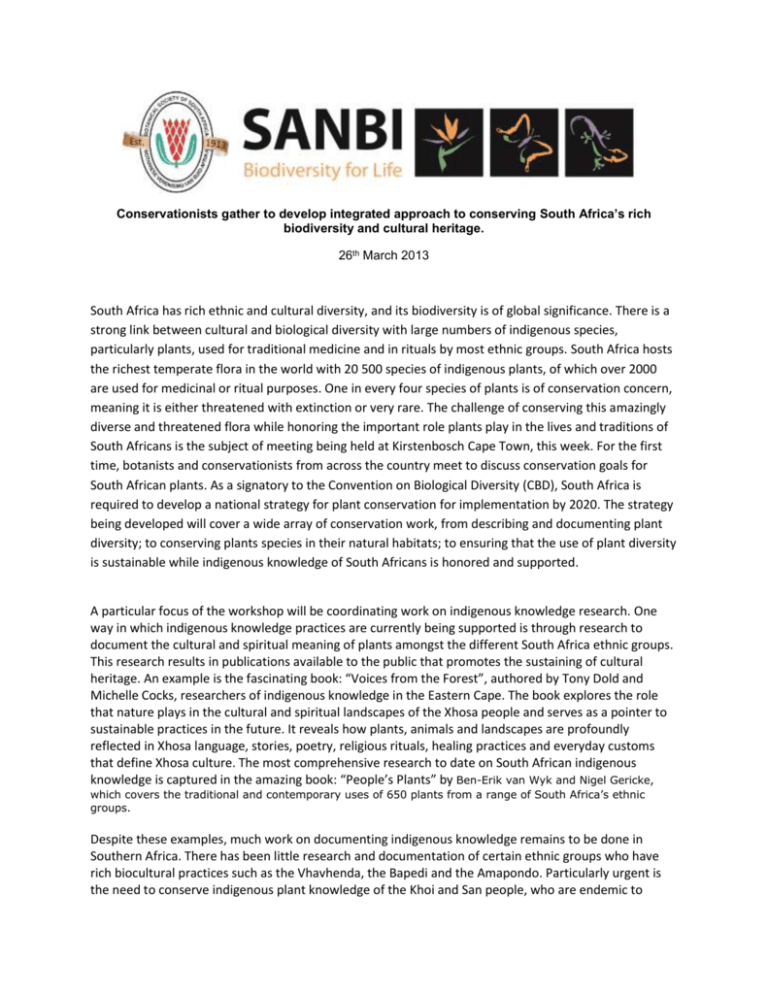
Conservationists gather to develop integrated approach to conserving South Africa’s rich biodiversity and cultural heritage. 26th March 2013 South Africa has rich ethnic and cultural diversity, and its biodiversity is of global significance. There is a strong link between cultural and biological diversity with large numbers of indigenous species, particularly plants, used for traditional medicine and in rituals by most ethnic groups. South Africa hosts the richest temperate flora in the world with 20 500 species of indigenous plants, of which over 2000 are used for medicinal or ritual purposes. One in every four species of plants is of conservation concern, meaning it is either threatened with extinction or very rare. The challenge of conserving this amazingly diverse and threatened flora while honoring the important role plants play in the lives and traditions of South Africans is the subject of meeting being held at Kirstenbosch Cape Town, this week. For the first time, botanists and conservationists from across the country meet to discuss conservation goals for South African plants. As a signatory to the Convention on Biological Diversity (CBD), South Africa is required to develop a national strategy for plant conservation for implementation by 2020. The strategy being developed will cover a wide array of conservation work, from describing and documenting plant diversity; to conserving plants species in their natural habitats; to ensuring that the use of plant diversity is sustainable while indigenous knowledge of South Africans is honored and supported. A particular focus of the workshop will be coordinating work on indigenous knowledge research. One way in which indigenous knowledge practices are currently being supported is through research to document the cultural and spiritual meaning of plants amongst the different South Africa ethnic groups. This research results in publications available to the public that promotes the sustaining of cultural heritage. An example is the fascinating book: “Voices from the Forest”, authored by Tony Dold and Michelle Cocks, researchers of indigenous knowledge in the Eastern Cape. The book explores the role that nature plays in the cultural and spiritual landscapes of the Xhosa people and serves as a pointer to sustainable practices in the future. It reveals how plants, animals and landscapes are profoundly reflected in Xhosa language, stories, poetry, religious rituals, healing practices and everyday customs that define Xhosa culture. The most comprehensive research to date on South African indigenous knowledge is captured in the amazing book: “People’s Plants” by Ben-Erik van Wyk and Nigel Gericke, which covers the traditional and contemporary uses of 650 plants from a range of South Africa’s ethnic groups. Despite these examples, much work on documenting indigenous knowledge remains to be done in Southern Africa. There has been little research and documentation of certain ethnic groups who have rich biocultural practices such as the Vhavhenda, the Bapedi and the Amapondo. Particularly urgent is the need to conserve indigenous plant knowledge of the Khoi and San people, who are endemic to southern Africa and represent the most ancient cultural traditions in the world. In addition, research is required that shows the link between use of different species between the different ethnic groups. An even larger challenge to conservationists gathered at this week’s meeting is how to ensure that plants used for medicinal and ritual purposes are available to future generations. Currently due to increased urbanisation of South Africa’s population, many plants are harvested in large volumes from rural areas, transported to urban centers and sold in muthi markets. Harvesting of species for medicinal and ritual purposes is often destructive – the Red List of South African Plants shows that 656 plant species are heavily traded and 9% are threatened with extinction. Conservationists attending this meeting need to commit to up-scaling and coordinating efforts to ensure the sustainable utilization of South Africa’s plants on which so many of our people depend. This workshop is taking place at Kirstenbosch Garden and is hosted by the South African National Biodiversity Institute and the Botanical Society of South Africa. An event to celebrate work on Indigenous knowledge will take place at 6:00 pm, March 26th 2013, at the stone cottages at Kirstenbosch Gardens. Notes: The South African National Biodiversity Institute (SANBI) is responsible for exploring, revealing, celebrating and championing biodiversity for the benefit and enjoyment of all of South Africa’s people. Botanical Society Mindful of the role of the people of South Africa as custodians of the world's richest floral heritage, it is the Botanical Society’s mission to win the hearts, minds and material support of individuals and organisations, wherever they may be, for the conservation, cultivation, study and wise use of the indigenous flora and vegetation of southern Africa. Indigenous Knowledge: Knowledge systems embedded in the cultural traditions of regional, indigenous, or local communities. The Convention on Biological Diversity calls on parties to: respect, preserve, and maintain knowledge, innovations and practices of indigenous and local communities embodying traditional lifestyles relevant for the conservation and sustainable use of biological diversity, and promote their wider application with the approval and involvement of the holders of such knowledge, innovations and practices, and encourage the equitable sharing of the benefits arising from the utilization of such knowledge, innovations and practices. (United Nations 1992: 8) For more information contact: Domitilla Raimondo Threatened Species Programme Manager SANBI Tel: 012 843 5000 / 0834619681 d.raimondo@sanbi.org.za



